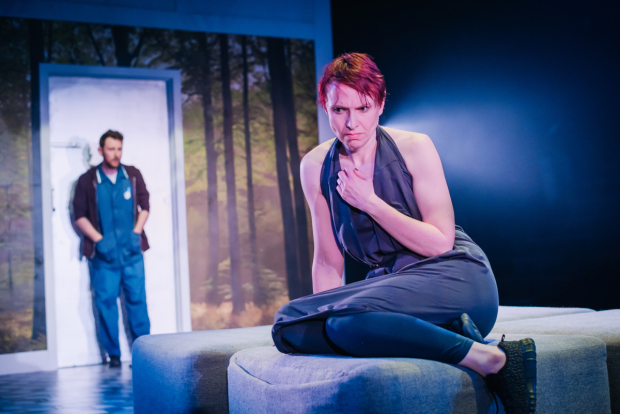Review: Girl in the Machine (Traverse, Edinburgh)

© Mihaela Bodlovic
When most people think of Edinburgh’s festivals, the first things that come to mind are Hogmanay and the massive jamboree of August. However, at this time of year the city also hosts one of Europe’s biggest Science Festivals, and it’s a testament to how enthusiastically the city embraces it that the two biggest producing theatres are currently staging science-themed plays as part of it (A Number opens at the Lyceum on 6 April).
The Traverse stages this new play by Stef Smith, directed by Orla O’Loughlin, the theatre’s artistic director, who recently staged Grain in the Blood. I say it’s new, but Smith’s theme travels well-trodden territory, and that’s both a strength and a problem.
Polly, a hot-shot lawyer, is married to Owen, a nurse. One day Owen brings home an electronic headset known as Black Box, whose precise function is never clearly delineated, but which helps the wearer to unplug from the daily grind. Gradually its hold over Polly grows, while at the same time an unsettling trend is growing across the globe for users to "upload" themselves onto a network, thus ending their physical lives but living forever through the machine.
Thus the scene is set for an exploration of the role of technology in modern life and its potentially dehumanising effects. It’s interesting, and undoubtedly current, and there are places where Smith’s script feels quite believable. Owen’s cluelessly vague description of how the device works ("something about brainwaves, something about syncing to your heartbeat…") will ring a bell with lots of technophobes, and there are plenty of people who will empathise with Polly’s inability to break her slavery to her screen.
I can’t help but think it has all been done before with more depth, though. (Bizarrely, I kept thinking of an episode of Star Trek which deals with very similar themes.) Rosalind Sydney and Michael Dylan act their parts convincingly enough, but often their dialogue is pretty formulaic, and they become types rather than fully developed characters. Once set upon their (rather predictable) character arcs they don’t tend to deviate from them, and I never felt that their relationship was more than a cipher for the ideas. Only once, in a monologue where Polly articulates her desire for the increasingly distant Owen, do you really glimpse depths beneath the surface of the character, and the extent of the technology’s impact on her never really struck me as believable.
Nor did I buy the rather implausible impact that Black Box has on the outside world. I really liked Neil Warmington’s ultra-minimalist design for the apartment, however, and his masterstroke is to encase the whole show in a massive metal box which retracts at the beginning and returns at the end, replicating the dehumanising effects of the technology on the people.
So the play is a laudable effort to involve the arts world in Edinburgh’s science festival but, like Polly and Owen, it needs more humanity to make it really work.
Girl in the Machine runs at the Traverse Theatre as part of Edinburgh International Science Festival until 22 April.










